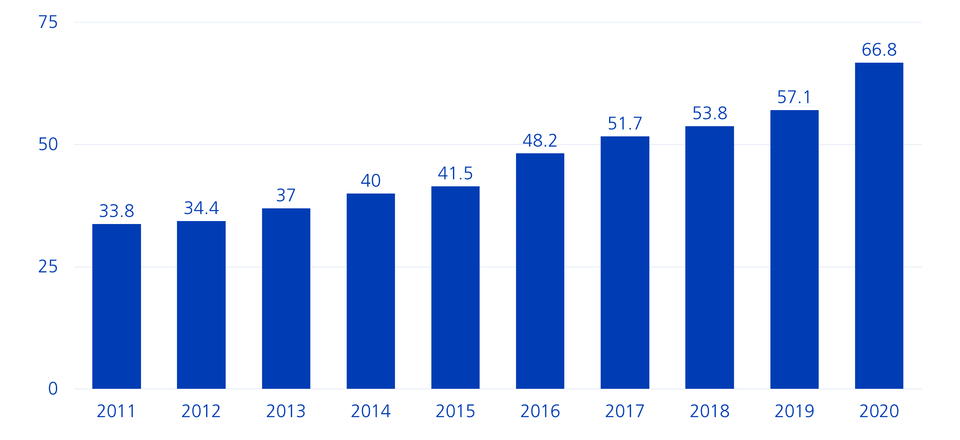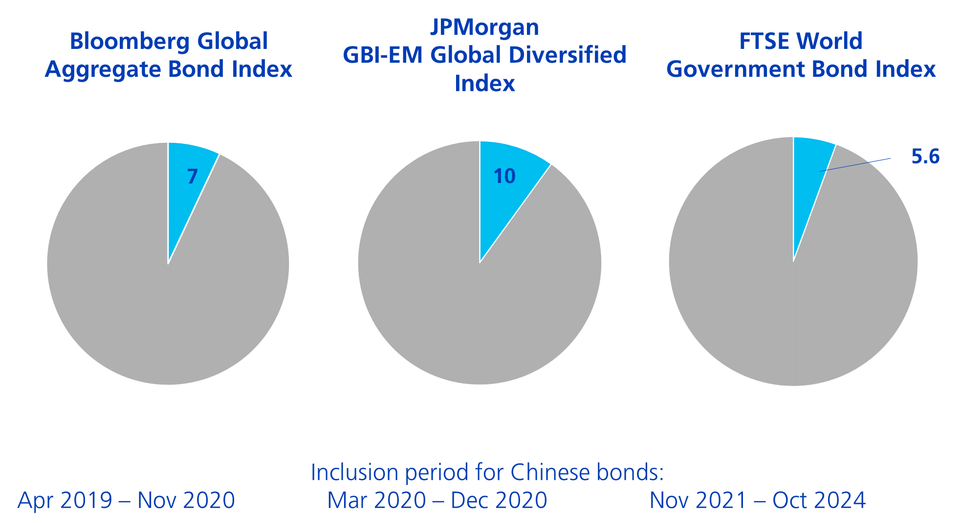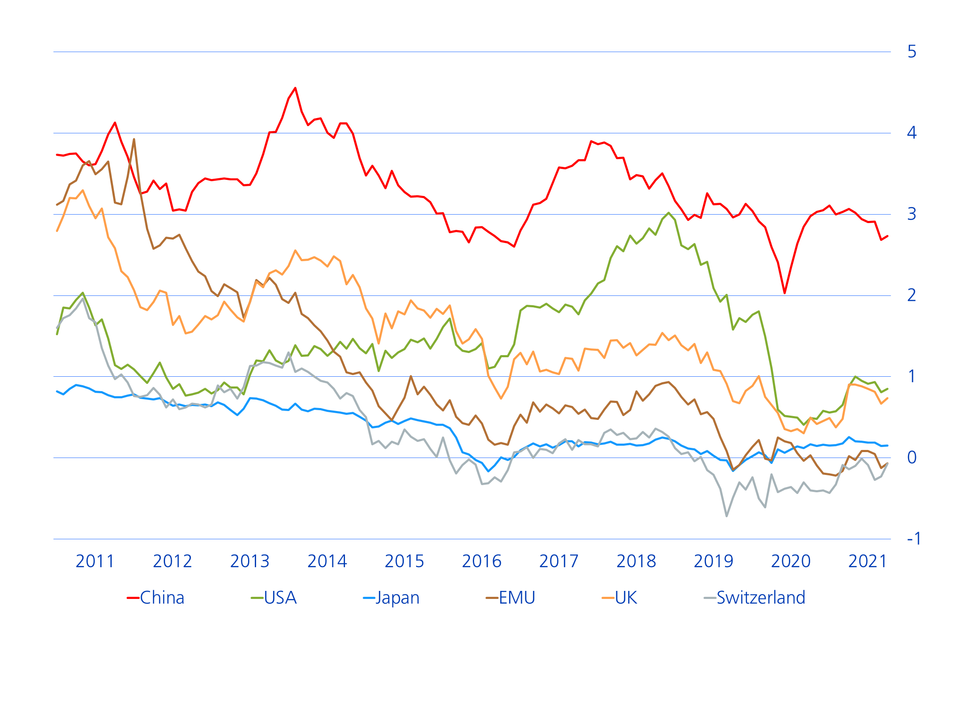Chinese government bonds: tapping into a growing market with index funds
China is the second largest economy in the world. The country's bond market is growing strongly. Many international investors are still under-invested in Chinese bonds, although market access has become significantly easier in recent years. Chinese government bonds offer a globally diversified bond portfolio both historically and currently with attractive properties. We have added an index-linked component for Chinese government bonds to our index range.

With a volume of more than USD 19 trillion, the Chinese bond market is the second largest in the world after the US bond market. With double-digit growth in recent years, it is also one of the fastest-growing bond markets. This trend reflects China's increasing public debt. Despite the increase in recent years, the absolute level of Chinese public debt has so far been low by international standards.
Chinese national debt as a percentage of GDP

Improved access to the bond market
Access to the Chinese bond market has historically been relatively limited. The progress made for international investors in opening up the Chinese financial sector led to greater interest in Chinese onshore bonds. Direct access was considerably simplified with the introduction of the China Interbank Bond Market and Bond Connect channels. Bond Connect stands out today due to its relatively fast application process and the facilitation of electronic trading via established offshore trading platforms and is therefore preferred by investors.
Inclusion in international bond indices
Improved market access has had an impact on the composition of various global bond indices. For instance, the Bloomberg Global Aggregate Bond Index in 2019 and the J.P. Morgan GBI EM Global Diversified Index in 2020 began to gradually include onshore China bonds. From November 2021, Chinese bonds will now be gradually included in the FTSE World Government Bond Index over a period of 36 months. This means that Chinese bonds will be represented in three key global bond indices with a noticeable weighting (see chart).
Weighting of Chinese bonds in international bond indices

Inflows into Chinese bonds are expected to continue to increase, both as a result of inclusion in the indices and due to increasing interest from international investors.
Chinese government bonds: attractive combination of risk and return
Against the backdrop of low or even negative interest rates in many developed countries, Chinese government bonds clearly stand out with a current yield to maturity of around 2.73 percent. With a rating of A+ and lower volatility than comparably valued government bonds, Chinese government bonds are of high quality.
Yield to maturity of international government bonds

The People's Bank of China (PBoC) is currently seeking to strike a balance between promoting the ongoing recovery of the domestic economy, while at the same time consolidating the budget and normalising credit growth. In general, it is expected that a cautious monetary policy will be pursued and, if necessary, individual sectors of the economy will be provided with liquidity in a targeted manner. A significant tightening of monetary policy seems unlikely at present.
Unique characteristics of Chinese government bonds
In addition to higher yields, Chinese government bonds also offer attractive diversification opportunities. The comparatively low volatility is due to the fact that the Chinese bond market is dominated by domestic investors and is therefore less exposed to global market volatility. We also expect domestic demand to remain strong and the dominance of domestic investors to continue as the Chinese market opens up. The Chinese economy is likely to remain relatively independent of the rest of the world; Chinese monetary policy is also likely to be less strongly influenced by the US Federal Reserve than is the case for other central banks.
Chinese government bonds are characterised by a historically relatively low correlation with other asset classes. This offers opportunities for minimising risk in a global bond portfolio.
Low correlation of Chinese bonds with other asset classes

Currency: renminbi appreciation as a potential return driver
The strong capital flows of recent years, the interest rate advantage of Chinese government bonds and the monetary policy of the largest central banks have led to an appreciation of the renminbi against the currencies of industrialised countries and also against the Swiss franc. Although the PBoC is likely to counteract further strong currency appreciation, further inflows into Chinese equities and fixed-income investments are likely to support the currency, which represents a potential driver of returns for investors in government bonds without currency hedging. According to current estimates by FTSE Russell, some USD 350 billion could be invested in Chinese government bonds by foreign investors over the next three years.
Chinese government bonds unaffected by Evergrande
The current developments regarding the increasing regulation of private economic sectors and the deliberate cooling of the real estate market show the continued strong influence of the government on the Chinese financial market. The developments around Evergrande have not yet led to an increase in risk aversion for Chinese government bonds. Despite the ongoing risks of investing in the Chinese financial market (political risks, risk of sharp rises in public debt, geopolitical risks and ESG risks), China has a great interest in bringing foreign capital into the country. Not only does China need to attract more capital from international investors in the future due to its structurally declining current account surplus, but it also needs to develop a sustainable pension system as the population is ageing rapidly. At the same time, the stability of its own currency and the bond market is an important prerequisite for China's increased importance in the international context. China passed an important test in this regard in 2020.
New: Swisscanto index product for Chinese government bonds
International bond investors are increasingly taking into account the growing importance of the Chinese bond market. We are therefore now offering investors the opportunity to invest in the Chinese government bond market with the Swisscanto (CH) Index Bond Fund China Govt.


